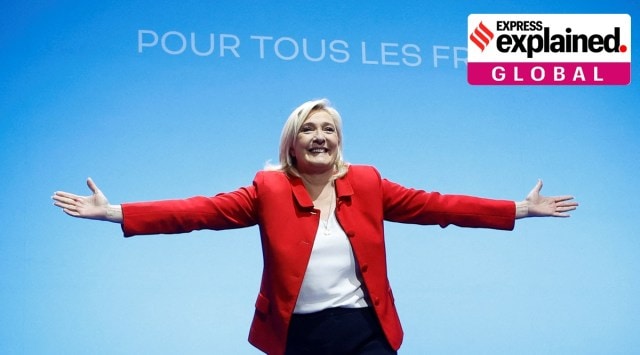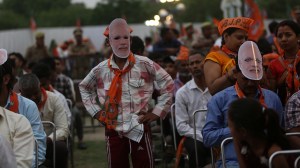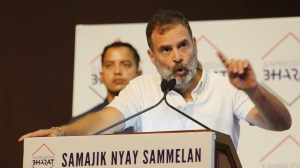- India
- International
Explained: Who is Marine Le Pen, the far-right candidate up against Emmanuel Macron in France elections?
Le Pen’s skirmishes with the European Union, a history of proximity with Russian President Vladimir Putin, and a recent call for rapprochement between NATO and Russia have turned several heads in the West. We take a look at Le Pen's anti-immigration policies and her chances of winning the French elections.
 Marine Le Pen, French far-right National Rally (Rassemblement National) party candidate for the 2022 French presidential election, attends a campaign meeting in Avignon, France, April 14, 2022. (Reuters)
Marine Le Pen, French far-right National Rally (Rassemblement National) party candidate for the 2022 French presidential election, attends a campaign meeting in Avignon, France, April 14, 2022. (Reuters)Coming a close second in the first round of France’s presidential election held on April 10, Marine Le Pen managed to bring her far-right National Rally party to the mainstream. A staunch nationalist, Le Pen this election has seemingly tempered her extremist views to appeal to a wider range of voters. With talks of unions and giving money back to the French poor, Le Pen looks to attract leftist voters. At the same time, she also carries the weight of the legacy left behind by her father, Jean-Marie Le Pen, the founder of the erstwhile National Front party.
Jean-Marie, known for his controversial, racist, and anti-Semitic remarks, was once dubbed ‘le diable’ (the devil). When Le Pen rose through the ranks, she was called ‘la fille du diable’ or ‘the devil’s daughter’. Since then, she has worked hard to tone down her perception as a hardliner. Yet, her anti-immigration and anti-Islamic stance remain in line with the far-right ideology.
Le Pen’s skirmishes with the European Union, a history of proximity with Russian President Vladimir Putin, and a recent call for rapprochement between NATO and Russia have turned several heads in the West that now await the results of the elections.
The 2022 Presidential elections will see Le Pen battle with Emmanuel Macron, the incumbent French President, for the second time. She has managed to secure 23.2 per cent of the votes in the first round, just 4.6 percentage points behind Macron’s 27.8.
The gap between the two candidates has widened from 2017 when Le Pen was just 2.71 percentage points behind Macron in the first round. Polls, however, show a neck-to-neck result in the second round. According to Ipsos, a Paris-based market research organization, the balance of power tips in Macron’s favour with 54 per cent, and 46 per cent for Le Pen. During the last elections, Le Pen lost with a much larger margin securing 33.90 per cent against Macron’s 66.10 per cent.

 Official campaign posters of French President Emmanuel Macron and Marine Le Pen, leader of French far-right National Rally party, are displayed at France Affichage Plus dispatch hub in Mitry-Mory, outside Paris, France. (Reuters)
Official campaign posters of French President Emmanuel Macron and Marine Le Pen, leader of French far-right National Rally party, are displayed at France Affichage Plus dispatch hub in Mitry-Mory, outside Paris, France. (Reuters)
Le Pen and her rise in French politics
Born in August 1968, Le Pen recalls in a memoir that a bomb blast at their apartment when she was eight years old heralded a political awakening. With degrees in criminal law, Le Pen joined her father’s National Front party in 1998.
 She went on to hold positions of a regional councillor, a municipal councillor and a member of the European Parliament. She became the vice president of the party in 2003 and eight years later, she succeeded her father to become the chief of the National Front. In 2012, she competed in the Presidential elections, ending up third.
She went on to hold positions of a regional councillor, a municipal councillor and a member of the European Parliament. She became the vice president of the party in 2003 and eight years later, she succeeded her father to become the chief of the National Front. In 2012, she competed in the Presidential elections, ending up third.
Le Pen has often distanced herself from the views of her father, who has had several convictions over hate speech. Le Pen expelled him from the party in 2015 after he defended his 1996 remarks calling the Nazi gas chambers a mere “detail in the history of World War 2”. Le Pen had publicly expressed her disagreement with Jean-Marie at the time. In 2018, she even rebranded the party as National Rally, in a further move to establish her own identity.
In the last five years, she has changed or somewhat softened her stance on immigration, gay marriage, and abortion. However, her views still remain fiercely nativist and conservative.
Le Pen on immigration and Islam
Le Pen’s campaign has been boosted by the rise of far-right leader Eric Zemmour. Though he garnered just over 7 per cent of votes in the first round, his adherence to hardcore far-right ideology such as the ‘great replacement theory’ which suggests that “elites” are looking to replace the French population with non-Europeans, and his refusal to coexist with Islam, has made Le Pen seem a more palatable candidate.
However, ending “uncontrolled immigration” through a referendum is also first on the list of agenda laid out by Le Pen. Though she no longer seeks an end to dual citizenship, she plans to make it harder for immigrants to take up residence or receive aid.
She wants to end family reunification, through which immigrants can take up French residence if their relative is a resident; end residence permit of foreigners unemployed for over a year; and expel all foreign delinquents or criminals. She also seeks to make it harder to get French citizenship, abolishing jus soli or birthright citizenship.
Her agenda also allows for discrimination between French citizens and immigrants, reserving social aid for the French and allowing access to non-citizens only after five years of work. She also says “national priority” should be ensured in access to social housing and employment.
The second point in her agenda is “eradicating Islamist ideology”. In her recent public appearances, she was seen taking a selfie with a teenager donning a hijab, and in 2021, she remarked, “…because I am strongly attached to our French values, I want to conserve total freedom of religion.” However, she seeks to impose a nation-wide ban on wearing headscarves in public.
Le Pen on EU, NATO and Russia
The war in Ukraine has brought focus on Le Pen’s past association with Putin. In 2017, she visited Russia in the run-up to the election and even defended the Kremlin’s annexation of Crimea. This time, she has distanced herself from Moscow, asserting her disapproval of Putin’s invasion of Ukraine, calling it “indefensible”.
However, on Wednesday, she warned against sending weapons to Ukraine, stating that there was a thin line between “aid and becoming a co-belligerent”. Le Pen during her election campaign has also said that if elected, she will pull France out of the integrated military command of NATO. “I would place our troops neither under an integrated NATO command nor under a future European command,” she said.
She also called for rapprochement between NATO and Russia, stating that better ties with Moscow will be in the interest of France, Europe, and the United States, to stop the strengthening of China-Russia ties.
While Le Pen is no longer calling for France to leave the European Union, she has reiterated her stance that French law should be given primacy over EU laws. Experts have noted that some of her policies such as restrictions over access to aid for non-French citizens, more control over borders, and cutting France’s contribution to the EU budget by 5 billion Euros a year, could trigger infringement proceedings against the country.
Can Le Pen win?
Ifop, a polling and market research company, predicts a tight race between Macron and Le Pen, ending at 51 to 49, with a win for the Centrist leader. According to an analysis by the Financial Times, which extrapolates the voting patterns of the Gironde administrative department, Le Pen gathered much of her votes from rural areas on the outskirts of cities. Her focus on the cost of living in her campaigns has managed to resonate with the poor, who have been impacted by the rising costs and globalization, which cut down their local businesses.
Le Pen’s promises of cutting down tax on energy and scrapping income tax for youngsters and her anti-immigration policies have found popularity amongst those dealing with inflation. Macron, however, has accused her of lying, saying that her economic policies were just a “fantasy”.
Newsletter | Click to get the day’s best explainers in your inbox
The far-right leader’s voters largely remain those living outside of big cities such as Paris, and those with a maximum education of up to 15 years of age, another report by the Financial Times says. For Macron to win, he must appeal to this section of the society, while Le Pen would have to widen her voter base to include educated, relatively wealthier citizens of France.
Political analysts have expressed concerns that a win for Le Pen will add to the rise of right-wing leaders such as Hungary’s Viktor Orban or Serbia’s Aleksandar Vucic, whose nationalist stance could threaten porous borders and the free market.
Even if she wins, Le Pen will be tasked with securing a majority in Parliament where she currently holds just eight seats. The elections to the French Parliament will be held in two rounds in June to elect 577 members.
EXPRESS OPINION
Apr 25: Latest News
- 01
- 02
- 03
- 04
- 05









































